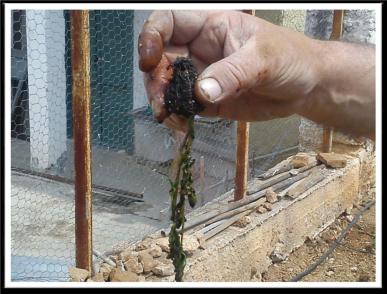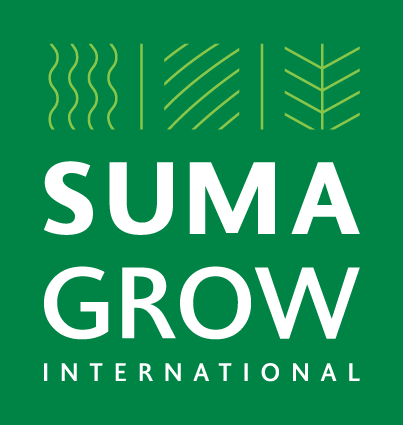TOMATOES
21.6% Improvement in Brix Level of Tomatoes in South Africa
 First tomato results in South Africa: 30 days before harvest!
Brix (Sugar Content): Brix is the most important commercial indicator, because many cash crop producers are reliant on Brix % to determine the sale value of their produce. The preliminary Brix results are exciting – a 10% increase at this early stage indicates a projected final 20% uplift in Brix.
Size (weight): Estimated size increase of 40% is a fantastic early stage result. Further: the testing farmer estimates around 30% more tomatoes per plant!
Quality/Taste: The farmer reports that some of the untreated tomatoes were already dying, compared to the SumaGrow treated tomatoes, that were “looking great”.
Even at this early stage, the farmer indicated a clear positive difference in the taste of the SumaGrow grown tomatoes.
Tomatoes Update
4 weeks before the harvest the Brix measured 6.6% (well on its way to the projected over 7.5%) for SumaGrow treated tomatoes and 6.0% for control, representing then already a 10% improvement.
After a severe cold spell, at harvest the Brix measured 6.2% for SumaGrow treated and 5.1% for control, representing a 21.6% improvement.
“I was absolutely delighted when I discovered the Brix result. After a severe cold spell, I was expecting a major decline in the Brix levels, however, the SumaGrow treated tomatoes maintained its high Brix level beyond my expectation. This will affect my pocket in the best possible way, thank you SumaGrow!” – Christian Schutte
First tomato results in South Africa: 30 days before harvest!
Brix (Sugar Content): Brix is the most important commercial indicator, because many cash crop producers are reliant on Brix % to determine the sale value of their produce. The preliminary Brix results are exciting – a 10% increase at this early stage indicates a projected final 20% uplift in Brix.
Size (weight): Estimated size increase of 40% is a fantastic early stage result. Further: the testing farmer estimates around 30% more tomatoes per plant!
Quality/Taste: The farmer reports that some of the untreated tomatoes were already dying, compared to the SumaGrow treated tomatoes, that were “looking great”.
Even at this early stage, the farmer indicated a clear positive difference in the taste of the SumaGrow grown tomatoes.
Tomatoes Update
4 weeks before the harvest the Brix measured 6.6% (well on its way to the projected over 7.5%) for SumaGrow treated tomatoes and 6.0% for control, representing then already a 10% improvement.
After a severe cold spell, at harvest the Brix measured 6.2% for SumaGrow treated and 5.1% for control, representing a 21.6% improvement.
“I was absolutely delighted when I discovered the Brix result. After a severe cold spell, I was expecting a major decline in the Brix levels, however, the SumaGrow treated tomatoes maintained its high Brix level beyond my expectation. This will affect my pocket in the best possible way, thank you SumaGrow!” – Christian Schutte Greece – Alfalfa, Tomatoes, Peppers, and Eggplants
The plants were in poor condition before the development period began, as seen to the right.
Throughout the study conducted by Ergoefarmogi, the plants went from lifeless to thriving (seen below), and this was achieved without the use of fertilizer.
 Over 60 days, faster and greater development and also intense flowering were observed. There was an increase in size and quality of the crops and an increased productivity from 30 to 80% per crop. An absence of fungus and other microorganism as well as various insects was observed. The plants were completely healthy throughout the duration of the development period. They were more alive, had vivid colors, and had visible difference in the size compared to those plants that had used conventional fertilizer. Their growth was also faster with better quality regarding their look and their taste. After the pruning during the productive seasons, they obtained branches and flowers and the production increases dramatically, and the fruit quality was evident in the excellent taste.
Over 60 days, faster and greater development and also intense flowering were observed. There was an increase in size and quality of the crops and an increased productivity from 30 to 80% per crop. An absence of fungus and other microorganism as well as various insects was observed. The plants were completely healthy throughout the duration of the development period. They were more alive, had vivid colors, and had visible difference in the size compared to those plants that had used conventional fertilizer. Their growth was also faster with better quality regarding their look and their taste. After the pruning during the productive seasons, they obtained branches and flowers and the production increases dramatically, and the fruit quality was evident in the excellent taste.
 With the alfalfa crop, at least 40-60% faster and greater growth was observed. Also greater productivity was shown by the intense dark green color, deeper roots system, denser and larger size of the plant.
With the alfalfa crop, at least 40-60% faster and greater growth was observed. Also greater productivity was shown by the intense dark green color, deeper roots system, denser and larger size of the plant.
81.1% Yield Increase for Vegetables in Kenya
The results indicated that application of SumaGrow produced a consistent positive effect on plant growth and yield on both crops at each site. Higher rates of SumaGrow had a pronounced effect on vegetative growth while better effects on harvestable yield were achieved at a lower product rate of 3.8L/acre. These results support the recommendation of SumaGrow for use as a biofertilizer on horticultural crops in Kenya.
Tomatoes – the best effect of SumaGrow on plant height was achieved when the product was applied at the rate of 11.4 L/ha in combination with DAP at 100kg/ha at planting. This treatment has a mean plant height of 45.42cm in treated tomato plots at flowering state, compared to 28.17cm mean plant height in untreated control plots.
Significantly greater effects on yield were achieved in plots treated with SumaGrow in combination with DAP at planting. Application of SumaGrow during planting at the rate of 3.8 L/acre in combination with 100kg per acre of DAP produced the highest fruit yield per plant (4.31kg). This is in contrast to mean weights of 2.38kg per plant in the untreated control plots and 3.70kg per plant in the grower’s standard crop nutrition practice application of 200kg/acre DAP at planting. There was an 81.1% yield increase from the control plot to the SumaGrow treated plots.
SumaGrow Peer Reviewed Journal Article
This article was written by Dr. Lalithakumari Janarthanam who served for six years as our Director of Research & Development (now retired). In the U.S., we are not allowed to make any biopesticidal claims, so the article title and abstract are copied here with a link to the article below, without comment:
Bioprotectant with multifunctional microorganisms: A new dimension in plant protection
ABSTRACT In the present investigations it is proved that the inoculation of multifunctional microbial formulation to the soil improves soil quality, soil health, plant health, growth, yield, and quality of a broad spectrum of crops reducing chemical fertilizer and pesticide input. These microbial populations consist of selected species including plant growth promoting rhizo-bacteria, N2-fixing bacteria, Phosphate solubilizers, phytohormone producers, plant disease suppressive bacteria and fungi. To make it very simple a different dimension as „Bio Protectant” is given in this presentation to the collective synergistic effects of beneficial microbes stimulating soil, plant and environmental health reducing chemical fertilizer and pesticide application. A healthy plant does not require unwanted, poisonous chemical pesticides. Review of literature is focused in multiple ways on the growth promoting ability along with the biological activity of beneficial microorganisms. The present SumaGrow-F2 formulation contains multi-functional Rhizobium species, Pseudomonas spp., Bacillus, and Trichoderma spp. The recorded novel benefits of SumaGrow-F2 formulation in the Green House and Field are discussed here as microbes increasing plant health, soil health, and root health of a broad spectrum of crops. Not only can it eliminate almost all insect infestations and reduce fungal or bacterial infection, it also creates a healthier environment for plant growth. The result is healthy crops with a corresponding increase in the yield of fruits or vegetables or grains. Modern trend is to look for inspiring intelligent multi-functional microbial Plant protectant or bio protectant for sustainable agriculture.
SumaGrow Microbes Mentioned In Gardening Book
The following is an excerpt from Cherie Everhart’s book the Complete Guide to Growing Tomatoes: A Com plete Step-by-Step Guide Including Heirloom Tomatoes:
Another approach for feeding the soil and mitigating disease risk in an organic fashion has been developed at Michigan State University and is being marketed by the company Bio Soil Enhancers. This is basically a formulation of specially selected microbes that are added to the soil. These microbes have several important functions. Most importantly, they are designed to fix nitrogen from the air into a form the plants can take up as nutrients. Secondly, these microbes compete with pathogenic microbes in the soil and reduce the likelihood of plant disease. Finally, some of the microbes act to produce metabolites that simulate root and plant growth. These microbes essentially allow nutrients in the air and soil to become bio available for plant use without the need for additional petrochemical based fertilizers. According to Lou Elwell, who is the President of Bio Soil Enhancers, Inc., “This approach is applicable to a variety of grain and vegetable crops as well as lawns. It offers an amazing opportunity to increase world food supplies. It also promises an important reduction in synthetic fertilizer use.”
The Bio Soil team has a special, organic formulation specifically designed for tomatoes. The results using the product on tomatoes are especially impressive. “In a greenhouse setting, the use of the Bio Soil microbes increases the yield of tomato plants by 400 percent over conventional fertilizers alone.” says Lou. “The average size of the tomatoes increased by 88 percent using the Bio Soil microbes.” In addition, the tomatoes had a faster germination rate and flowered more quickly when using the Bio Soil microbes.
The Bio Soil formulation also contains humates and plant micro nutrients. Humates are the product of organic matter degradation and provide a food supply for the microbes. According to Lou, “The use of Bio Soil microbes will cost less than conventional synthetic fertilizers. Also, we are currently in the process of applying for organic certification for our formulations.”
Quick Links
Follow Us
SumaGrow International
1534 Tenth St., Suite #10
Santa Monica, CA 90401
info@sumagrowintl.com
Subscribe
©2024 SumaGrow, International – Premier OMRI Organic Certified Biofertilizer
